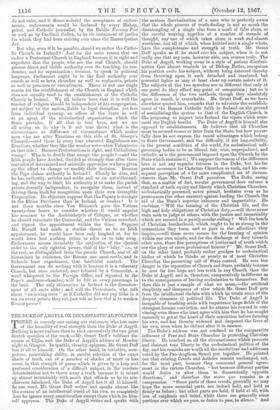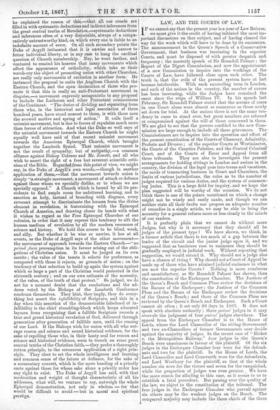THE DUKE OF ARGYLL ON ECCLESIASTICAL POLITICS.
THERE is scarcely one among our statesmen who has more of the humility of real strength than the Duke of Argyll. Nothing is more curious than to read successively the two great Scotch speeches of the week,—Mr. Grant Puff's brilliant dis- course at Elgin, and the Duke of Argyll's address of Monday night at Glasgow. In sparkle, vivacity, epigram, Mr. Grant Duff has it all to himself. On the other hand, in tentative, scru- pulous, painstaking ability, in careful selection of the exact shade of truth out of a number of shades of more or less error, in that strength of grasp which is given by a long and profound consideration of a difficult subject, in the resolute determination not to throw away a truth because it is mixed up almost inextricably with much that offends us by its mis- chievous falsehood, the Duke of Argyll has it all to himself. In one word, Mr. .Grant Duff writes and speaks almost like the creator of an intellectual world of his own, so completely does he ignore every consideration except those which he him- self approves. The puke of Argyll writes and speaks with the anxious discrimination of a man who is perfectly aware that the whole process of truth-finding is not so much the disentangling of a single clue from a mesh of false clues, as the careful weaving together, of a number of strands of thought, any one of which taken alone is weak and almost worthless, but all of which, when knitted into a single whole, have the completeness and strength of truth. Mr. Grant Duff speaks as if he stood over his subject, when it is not really one that any man, however able, can oversee truly. The Duke of Argyll, working away in a style of patient discrimi- nation that almost reminds us of Bishop Butler, recognizes his position under his subject, without being deterred thereby from throwing upon it such detached and insulated, but powerful lights as may at least clear up certain points of it. The subjects of the two speeches are so different that only at one point do they afford any point of comparison ; but on it the difference of the two methods, though they absolutely agree in result, is remarkable. Mr. Grant Duff, as we have elsewhere quoted him, remarks that to advocate the establish- ment of the Roman Catholic faith in Ireland on the ground of assimilating the system to that of the English Church, is like proposing to import into Ireland the vipers which orna- ment our English heaths. The Duke of Argyll is himself also opposed to establishments. He believes that all Churches must be severed sooner or later from the State, but how power- fully does he not express the moral advantages which belong to State Government, and the difficulty, if not impossibility, in the present condition of the world, for ecclesiastical self- governing bodies to be as liberal, fair, wise, unprejudiced, and catholic, as is the government imposed upon the Church by the State which sustains it ! We suppose the reason of the difference here is not any superior fairness in the Duke, but his far greater reverence for Christian Churches as such, and his con- sequent perception of a far more complicated set of _circum- stances than Mr. Grant Duff perceives. The Duke, seeing that, as a matter of fact, secular government does enforce a standard of both equity and liberty which Christian Churches, ecclesiastically governed, never permit, hesitates even as he pronounces (for other reasons) against lending the Church the aid of the State's superior calmness and impartiality. He exclaims, "Will the training of the Christian life, and the high and holy obligations of Christian duty,—will these never train men to judge of others with the justice and impartiality which are secured in a purely secular calling 11 Will the bonds of Christian brotherhood, which ought to be so strong in the connections they form, and so pare in the affections they inspire,—will these never secure for the forming of opinion within our own minds, and for the discharge of duty towards other men, those fine perceptions of justice and of truth which are the glory of mere professional honour ?" Mr. Grant Duff, on the- other hand, probably rather grudges to ecclesiastical bodies of which he thinks so poorly as of most Christian Churches the preserving salt of State control. He sees less danger in the separation of Church and State, probably because he sees far less hope and less truth in any Church than the Duke of Argyll, and is, therefore, comparatively indifferent as to the consequences of leaving ecclesiastics to themselves. But then this is just a sample of what we mean,—the artificial simplicity and sharpness of view which Mr. Grant Duff gets from the intellectual disdain with which he treats some of the deepest elements of political life. The Duke of Argyll is incapable of brushing aside with impatience large fields of the strongest human conviction, and he attains his reward in con- vincing even these who least agree with him that he has sought earnestly to get at the heart of their conviction before forming his own, and has thereby widened and deepened the force of his own, even when he did not alter it in essence.
The Duke's address was ,not confined to the comparative influence of Free and State Churches in protecting Christian liberty. He touched on all the circumstances which promote and obstruct true liberty in the ecclesiastical politics of the day, and his remarks are worth all the resolutions and addresses voted by the Pan-Anglican Synod put together. He pointed out that existing Creeds and Articles remain unchanged, not, for the most part, because they command general agree- ment in the various Churches, "but because different parties would desire to alter them in diametrically opposite directions," and therefore the status quo remains as a compromise. "Some parts of these creeds, generally we may hope the more essential parts, are indeed held, and held as firmly as before ; but other parts are held, if held at all, with less of emphasis and belief, while there are generally some portions over which we pass, or desire to pass, in. silence." And he explained the reason of this,—that all our creeds are filled in with systematic deductions and indirect inferences from the great central truths of Revelation,—systematic deductions and inferences often of a very disputable, always of a compa- ratively untrustworthy kind, on which every one is liable to an indefinite amount of error. On all such secondary points the Duke of Argyll intimated that it is unwise and narrow to fetter individual liberty, or in any case to hang the cardinal question of Church membership. Nay, he went farther, and .1 ventured to remind his hearers that many movements which affect the appearance of catholicity, which take as their watch-cry the object of promoting union with other Churches, are really only movements of exclusion in another form. He instanced the proposal to unite the Anglican Church with the Eastern Church, and the open 'declaration of those who pro- mote it that this is really an anti-Protestant movement in disguise,—a movement expressly antagonistic to any proposal to include the Lutheran and other Protestant communions of the Continent. "The desire of dividing and separating from those who, in the historical and legal association of three hundred years, have stood nearest to them, is with these men the avowed motive and spring of action." It calls itself a unionist movement, but is due to forces of repulsion much more than forces of attraction. And what the Duke so well says of the unionist movement towards the Eastern Church he might equally well have said of that recent unionist movement towards the American Episcopal Church, which brought together the Lambeth Synod. That unionist movement is not the result of sympathy, but of antipathy,—a common alliance against Bishop Colenso and Mr. Jowett, and all who wish to assert the right of a free but reverent scientific criti- cism of the Bible. Regarded from this point of view, we might say, in the Duke of Argyll's own words,—though in another application of them,—that the movement towards union is simply "a. strategic movement, a movement of attack or defence against those whom we specially dislike, or to whom we are specially opposed." A Church which is bound by all its pre- cedents to find ample room for unfettered learning, and to sanction as holy, instead of branding with disgrace, every reverent attempt to discriminate the human from the divine element in revelation, is fraternizing with the Episcopal Church of America, and drawing closer its bonds with what it wishes to regard as the Free Episcopal Churches of our colonies, in order that it may repress this tendency to sift the human medium of revelation by all the modem resources of science and history. We hold this course to be blind, weak, and silly. But whether it be wise or unwise, it has at all events, as the Duke of Argyll says of the other movement— the movement of approach towards the Eastern Church—" no prima fade presumption in its favour arising out of the obli- gations of Christian union. It must be judged on its own merits ; the value of the tenets it selects for preference, as compared with those it rejects, as grounds of union ; on the tendency of that selection to build up again the system against which so large a part of the Christian world protested in the sixteenth century ; and on our own estimate of the necessity, of the value, of the truth of that protest." So judged, we do not for a moment doubt that the resolutions and the ad- dress voted by the Bishops of the Lambeth Conference condemn themselves. They hint, they imply, they do every- thing but assert the infallibility of Scripture, and this in a day when this assertioh of the demonstrable falsehood of in- fallibility is the chief stumbling-block which keeps educated laymen from recognizing that a fallible Scripture records a true and grand historical revelation of God, delivered through generation after generation of fallible men, until the coming of our Lord. If the Bishops wish for union with all who out- rage reason and science and sound historical evidenee, for the sake of repelling those who, in their hasty. zeal for reason and science and historical evidence, seeth to trench on some great central truths of the Christian faith,—they prefer a thoroughly rotten principle, to the erroneous application of a right prin- ciple. They elect to set the whole intelligence and learning and common sense of the future at defiance, for the sake of a momentary concert, which is the mere banding of a priestly caste against those for whose sake alone a priestly order has any right to exist. The Duke of Argyll has said, with that moderation and weight of thought characteristic of all his addresses, what will, we venture to say, outweigh the whole Episcopal demonstration, not only in wisdom — for that would be difficult to avoid—but in moral and spiritual prestige.































 Previous page
Previous page